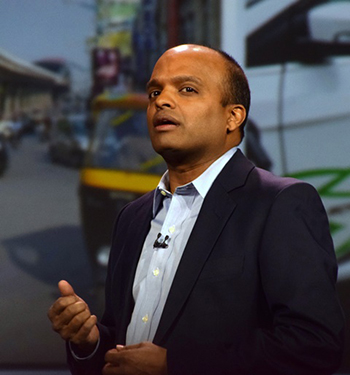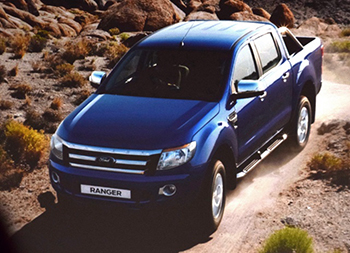LAS VEGAS – Ford must maintain a laser-like focus on providing “smart mobility” in a world growing more crowded every day, CEO and President Mark Fields says in his keynote speech here at the 2015 Consumer Electronics Show.
The Dearborn, MI, automaker announces 25 global experiments and research projects, including 11 from innovators outside Ford, intended to test new ideas and offer solutions in the world’s most congested megacities, such as Mumbai, India, and Shanghai.
“Today, there are 28 megacities or metropolitan areas with total population of more than 10 million people worldwide,” Fields says in his speech. “Fast-forward to 2030, and we expect to see at least 41 megacities.”
For context, he refers to heavy traffic here in Nevada’s casino capital during CES, which this year is drawing 180,000 people. There are few options this week for anyone who needs to get someplace quickly.
“Who finds it easy to get around Las Vegas during the show? Raise your hand,” Fields implores. Few do.
He says the Las Vegas metro area has more than 1 million people, with a population density of roughly 1,750 people per square-kilometer. “That puts Las Vegas as number 120 on the list of the largest cities in the world by population density,” he says. The extra congestion from CES lasts about a week.
Ford’s CEO contrasts Las Vegas with Mumbai, where 18 million people live and cope with a population density that is 17 times greater, making it the world’s largest city by population density.
“Its air quality and infrastructure are poor,” Fields says. “Cars inch along the roadway with horns blaring. Trains are so packed that commuters’ phones and eyeglasses often get crushed under the pressure of bodies.”
Americans may complain about traffic in certain parts of the country. But relative to the rest of the world, the U.S. generally bypasses the problem. “Only one American city ranks among the world’s top 100 most populated cities by density – Los Angeles, coming in at No. 90.”
Fields credits Executive Chairman Bill Ford for “warning of global gridlock if we do not deal with the realities of urbanization. The existing infrastructure for motor vehicles simply cannot sustain the sheer number of vehicles expected to be on the road in the coming years.”
Research Projects Under Way
The problem will worsen as the global middle class is expected to double in size by 2030 from 2 billion to 4 billion people, with Asia driving much of the growth, Fields says, citing a Brookings Institution study. Many of those people will aspire to own a car.
Still, many young Americans do not. Fields quotes one study finding 39% of people prefer traveling by bus, train or taxi so they can multi-task.
He finds a solution in smarter cars, roads and cities.
“We see a world where vehicles ‘talk’ to one another, drivers and vehicles communicate with city infrastructure to relieve congestion and where people routinely share vehicles or multiple forms of transportation for their daily commute,” Fields says.

To support the vision, the automaker announces Ford Smart Mobility, which constitutes 25 experiments and research projects around the globe, including car sharing in India and Germany, car swapping among Ford employees in Dearborn, rental cars on demand in London and a cloud-based network identifying available parking spots in Atlanta derived from information gathered by vehicle sensors.
In West Africa in Gambia, where unpaved roads and lack of reliable transportation can hinder health-care workers, Ford is creating detailed maps of little-known roads based on data collected from emergency vehicles.
Fields and his team also highlight 11 research programs initiated by innovators from outside Ford in all corners of the world.
Ideas include a mini-electric vehicle in Argentina; a Smartaxi to identify the areas of highest demand in Lisbon, Portugal; an app from Delhi, India, to assemble volunteers to help others in time of need; and an app for Los Angeles that alerts a vehicle owner when time on a parking meter is about to expire, then allows the owner to make a mobile payment.
The 25 research projects are intended to change the way the world moves by leveraging connectivity, autonomous technology, software, sensors and big data.
Mobility Research Leads to Autonomous Cars
Many of the pieces already exist and will be developed further, such as radar, cameras and sensors to enable adaptive cruise control, automated parking, emergency braking and lane keeping.
Ford has a fully autonomous vehicle on the road now undergoing testing, says Raj Nair, chief technical officer and group vice president-global product development.
“We have autonomous vehicles in our future plans,” Nair says on stage. “There absolutely will be a Ford autonomous vehicle in the future.”
Talking with journalists after the speech, Fields backpedals slightly from the prepared remarks.
“The industry will probably have a fully autonomous vehicle in five years. It may or may not come from Ford,” he says. “We want to make sure when we come out with a fully autonomous vehicle that it lives up to our heritage, which is being affordable and accessible to the masses.”
Fields draws hearty applause from the tech-savvy crowd with a pledge about customer data in the era of connected vehicles.
“We want to make a very clear statement today: We believe customers own their data,” he says. “We are simply stewards of that data, and we commit to being trusted stewards of that data.”
He goes on to say Ford may ask to use customer data “but only with explicit opt-in and full transparency. And if we use the data, we need to ensure that customers are receiving services or features they find valuable.”
Today’s vehicles produce massive amounts of data – more than 25 gigabytes of information each hour. Fields says this information can reveal important patterns about how people move.
The automaker is experimenting with a Big Data Drive in Dearborn with Ford employees who volunteer to participate. Data is captured from their vehicles and can be used to develop hardware and software to improve mobility, he says. Ford also is collecting driver data from a large fleet in London.

Cynics might view this as an invasion of privacy, but Fields sees it differently. For instance, what if a driver’s long-term data reflects an impeccable record of safe, environmentally friendly motoring within speed limits?
“Imagine that you could share that data with insurance companies to get better rates,” he says.
As an aside, fans who want the compact Ford Ranger pickup back in the U.S. may have been excited to see a crisp, blue model several times on the video screen behind Fields during the speech. The truck is popular in other markets but left the U.S. in 2011.
Asked if the product placement was coincidental, Fields says: “We’re a global company, and that’s our F-150 around the world.”





